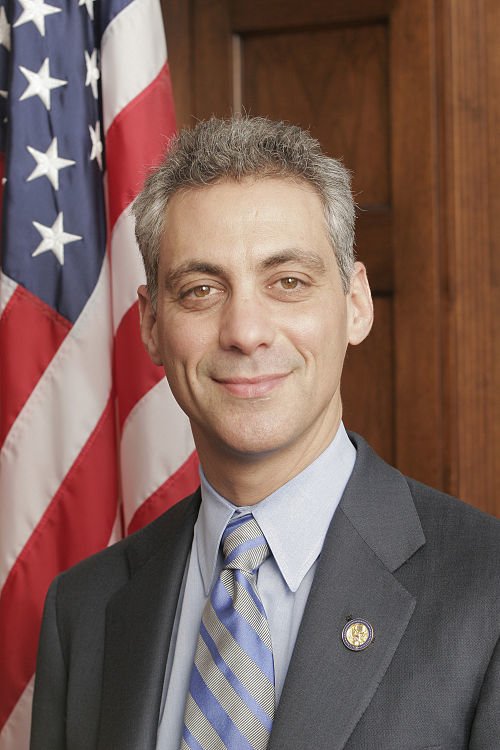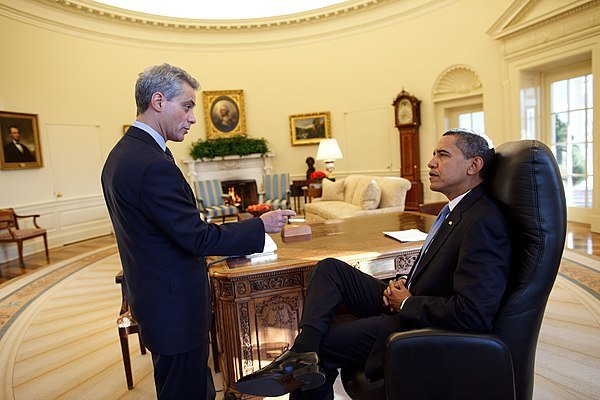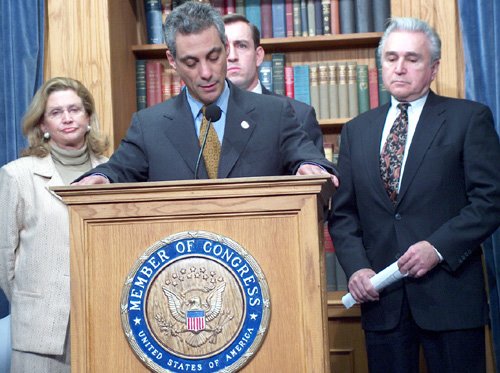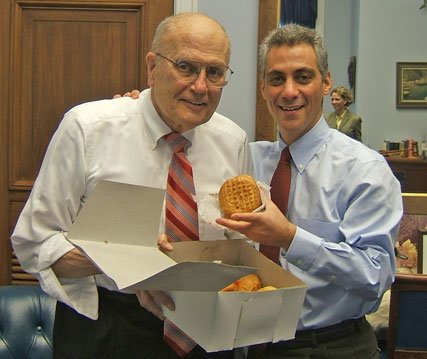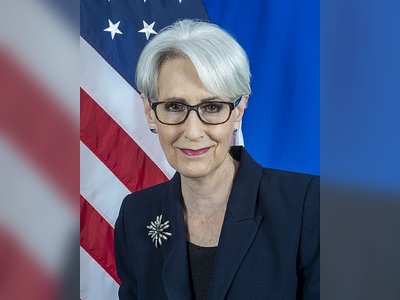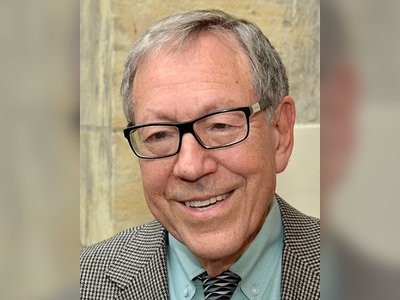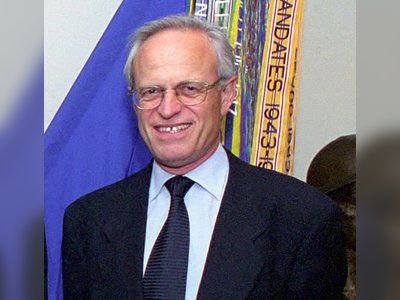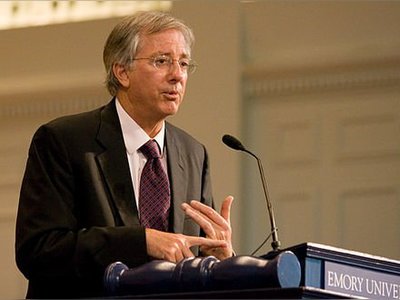מורשת גדולי האומה
בזכותם קיים
beta
Rahm Emanuel: A Political Career
Rahm Emanuel's political career has been marked by his strategic fundraising prowess, his role as a key player in Democratic Party leadership, and his dedication to shaping the party's message and electoral strategy. His achievements have left an indelible mark on American politics and earned him a reputation as a shrewd and influential political strategist.
Rahm Israel Emanuel, born on November 29, 1959, is an American Jewish politician who served as the mayor of Chicago from 2011 to 2019. Prior to his mayoral tenure, he held the position of White House Chief of Staff during President Barack Obama's administration.
Since 2003, Rahm Emanuel has been a prominent member of the United States Democratic Party, representing Illinois's 5th congressional district in the House of Representatives. During his tenure in Congress, he played a pivotal role in the Democratic Congressional Campaign Committee (DCCC), leading the party's efforts in the 2006 midterm elections and helping Democrats regain control of the House. As a staunch supporter of Israel, Emanuel was vocal about his views on Middle East policy within the House of Representatives.
Rahm Emanuel was born into a Jewish family in Chicago. His mother, Marsha Smulevitz, was a civil rights activist who was once involved with the Congress on Racial Equality. His father, Dr. Benjamin Emanuel, was an Israeli-American pediatrician and a former member of the Irgun, a Zionist paramilitary organization. The Emanuel family name was changed to honor Rahm's paternal uncle, Emanuel Auerbach, who tragically lost his life in a conflict with Arabs in Jerusalem in 1932.
Emanuel's older brother, Ezekiel "Zeke" Emanuel, is a professor of medicine at the University of Pennsylvania, while his younger brother, Ari Emanuel, is the CEO of William Morris Endeavor, a prominent talent agency in Beverly Hills.
Rahm Emanuel attended Sarah Lawrence College and later pursued a degree in communication at Northwestern University, which he obtained in 1985. Additionally, he had a background in dance and other liberal arts disciplines.
Emanuel initially engaged in fundraising for various political candidates, starting at the local level and later participating in national elections. In 1991, he joined Bill Clinton's presidential campaign as the campaign's finance director. Emanuel's determination to secure substantial campaign funding and postpone Clinton's entry into the race until later proved to be successful tactics. Notably, his efforts caused Paul Tsongas, Clinton's primary rival, to drop out of the race due to a lack of funds, while Clinton leveraged the financial support to deflect controversies such as the Jennifer Flowers scandal and his avoidance of military service in Vietnam.
Emanuel's aggressive approach to fundraising earned him the nickname "Rahmbo." After Clinton's election as President, Emanuel served as a senior adviser at the White House from 1993 to 1998, initially as an assistant for political affairs and later as a senior policy adviser. Among his significant roles during this period was managing the planning of the historic signing ceremony of the Oslo Accords between Israeli Prime Minister Yitzhak Rabin and Palestinian leader Yasser Arafat, which took place on the White House lawn.
In 1998, Emanuel left the White House and worked in investment banking in Chicago, amassing a significant fortune, reportedly over $16 million during his time away from politics. He was also appointed to the board of directors of Freddie Mac in 2000, a position he resigned from when he decided to run for a seat in the House of Representatives.
In the House of Representatives, Emanuel served on the Committee on Ways and Means, focusing on tax and budget issues. From 2006 until his appointment as White House Chief of Staff, he chaired the Democratic Congressional Campaign Committee (DCCC) and played a key role in the Democratic Party's strategy.
In 2002, Emanuel chose to run for the 5th congressional district seat in Illinois when it became vacant. His primary opponent in a crowded field of seven Democratic candidates was Nancy Kaszak, a former Illinois state representative. The most contentious moment of this election cycle was when Edward Moskal, president of the Polish American Congress, a group that supported Kaszak, referred to Emanuel as a "millionaire carpetbagger seeking office in an area he has no connection to and knows nothing about our heritage." Moskal also claimed that Emanuel held dual American-Israeli citizenship and served in the Israeli military.
Emanuel rallied support from a coalition of Chicago's diverse communities and strongly condemned Moskal's comments, which were widely criticized as being anti-Semitic, including by Kaszak herself. Emanuel won the general election with over 67% of the vote, defeating Republican opponent Mark Augusti.
In 2005, Emanuel was appointed as the chair of the Democratic Congressional Campaign Committee (DCCC), responsible for the Democratic Party's campaign efforts leading up to the 2006 midterm elections.
Emanuel declared that "victory is everything" and urged Democratic candidates to adopt more centrist positions, stating, "Reach out to the center, paint yourself as less liberal." He emphasized the recruitment of military veterans and Republicans who had crossed party lines as potential candidates. Emanuel's strategic approach to fundraising and candidate selection was in contrast to that of Howard Dean, chair of the Democratic National Committee, who favored the "50-state strategy," focusing on building a long-term Democratic presence in all states, even Republican strongholds. Emanuel believed in a more tactical approach, concentrating resources on key districts where victory would ensure control of the House of Representatives.
Emanuel's strategy paid off, as the Democratic Party won the 2006 midterm elections, regaining control of both houses of Congress by adding 30 additional seats in the House of Representatives. His role in this political shift earned him praise from fellow Democrats and secured his reputation as a prominent figure within the party.
Following the Democratic victory in the 2006 midterm elections, many believed that Rahm Emanuel was a leading candidate to become the Speaker of the House, which is the leader of the majority party in the House of Representatives. However, Nancy Pelosi, who became the Speaker, convinced Emanuel not to challenge African-American Congressman Jim Clyburn for the position. Instead, she offered Emanuel the chairmanship of the Democratic Caucus, which he accepted in exchange for expanded authority within the party leadership.
Emanuel's tenure as chairman of the Democratic Caucus marked a period of significant influence within the Democratic Party. He played a crucial role in shaping the party's legislative agenda and maintaining party discipline in the House of Representatives. His leadership style and ability to build consensus among Democrats contributed to the party's success during his time in this role.
Since 2003, Rahm Emanuel has been a prominent member of the United States Democratic Party, representing Illinois's 5th congressional district in the House of Representatives. During his tenure in Congress, he played a pivotal role in the Democratic Congressional Campaign Committee (DCCC), leading the party's efforts in the 2006 midterm elections and helping Democrats regain control of the House. As a staunch supporter of Israel, Emanuel was vocal about his views on Middle East policy within the House of Representatives.
Early Life
Rahm Emanuel was born into a Jewish family in Chicago. His mother, Marsha Smulevitz, was a civil rights activist who was once involved with the Congress on Racial Equality. His father, Dr. Benjamin Emanuel, was an Israeli-American pediatrician and a former member of the Irgun, a Zionist paramilitary organization. The Emanuel family name was changed to honor Rahm's paternal uncle, Emanuel Auerbach, who tragically lost his life in a conflict with Arabs in Jerusalem in 1932.
Emanuel's older brother, Ezekiel "Zeke" Emanuel, is a professor of medicine at the University of Pennsylvania, while his younger brother, Ari Emanuel, is the CEO of William Morris Endeavor, a prominent talent agency in Beverly Hills.
Rahm Emanuel attended Sarah Lawrence College and later pursued a degree in communication at Northwestern University, which he obtained in 1985. Additionally, he had a background in dance and other liberal arts disciplines.
Early Political Career
Emanuel initially engaged in fundraising for various political candidates, starting at the local level and later participating in national elections. In 1991, he joined Bill Clinton's presidential campaign as the campaign's finance director. Emanuel's determination to secure substantial campaign funding and postpone Clinton's entry into the race until later proved to be successful tactics. Notably, his efforts caused Paul Tsongas, Clinton's primary rival, to drop out of the race due to a lack of funds, while Clinton leveraged the financial support to deflect controversies such as the Jennifer Flowers scandal and his avoidance of military service in Vietnam.
Emanuel's aggressive approach to fundraising earned him the nickname "Rahmbo." After Clinton's election as President, Emanuel served as a senior adviser at the White House from 1993 to 1998, initially as an assistant for political affairs and later as a senior policy adviser. Among his significant roles during this period was managing the planning of the historic signing ceremony of the Oslo Accords between Israeli Prime Minister Yitzhak Rabin and Palestinian leader Yasser Arafat, which took place on the White House lawn.
In 1998, Emanuel left the White House and worked in investment banking in Chicago, amassing a significant fortune, reportedly over $16 million during his time away from politics. He was also appointed to the board of directors of Freddie Mac in 2000, a position he resigned from when he decided to run for a seat in the House of Representatives.
In the House of Representatives, Emanuel served on the Committee on Ways and Means, focusing on tax and budget issues. From 2006 until his appointment as White House Chief of Staff, he chaired the Democratic Congressional Campaign Committee (DCCC) and played a key role in the Democratic Party's strategy.
2002 Congressional Election
In 2002, Emanuel chose to run for the 5th congressional district seat in Illinois when it became vacant. His primary opponent in a crowded field of seven Democratic candidates was Nancy Kaszak, a former Illinois state representative. The most contentious moment of this election cycle was when Edward Moskal, president of the Polish American Congress, a group that supported Kaszak, referred to Emanuel as a "millionaire carpetbagger seeking office in an area he has no connection to and knows nothing about our heritage." Moskal also claimed that Emanuel held dual American-Israeli citizenship and served in the Israeli military.
Emanuel rallied support from a coalition of Chicago's diverse communities and strongly condemned Moskal's comments, which were widely criticized as being anti-Semitic, including by Kaszak herself. Emanuel won the general election with over 67% of the vote, defeating Republican opponent Mark Augusti.
Chairman of the DCCC
In 2005, Emanuel was appointed as the chair of the Democratic Congressional Campaign Committee (DCCC), responsible for the Democratic Party's campaign efforts leading up to the 2006 midterm elections.
Emanuel declared that "victory is everything" and urged Democratic candidates to adopt more centrist positions, stating, "Reach out to the center, paint yourself as less liberal." He emphasized the recruitment of military veterans and Republicans who had crossed party lines as potential candidates. Emanuel's strategic approach to fundraising and candidate selection was in contrast to that of Howard Dean, chair of the Democratic National Committee, who favored the "50-state strategy," focusing on building a long-term Democratic presence in all states, even Republican strongholds. Emanuel believed in a more tactical approach, concentrating resources on key districts where victory would ensure control of the House of Representatives.
Emanuel's strategy paid off, as the Democratic Party won the 2006 midterm elections, regaining control of both houses of Congress by adding 30 additional seats in the House of Representatives. His role in this political shift earned him praise from fellow Democrats and secured his reputation as a prominent figure within the party.
Leadership in the House of Representatives
Following the Democratic victory in the 2006 midterm elections, many believed that Rahm Emanuel was a leading candidate to become the Speaker of the House, which is the leader of the majority party in the House of Representatives. However, Nancy Pelosi, who became the Speaker, convinced Emanuel not to challenge African-American Congressman Jim Clyburn for the position. Instead, she offered Emanuel the chairmanship of the Democratic Caucus, which he accepted in exchange for expanded authority within the party leadership.
Emanuel's tenure as chairman of the Democratic Caucus marked a period of significant influence within the Democratic Party. He played a crucial role in shaping the party's legislative agenda and maintaining party discipline in the House of Representatives. His leadership style and ability to build consensus among Democrats contributed to the party's success during his time in this role.
- רם עמנואלhe.wikipedia.org
